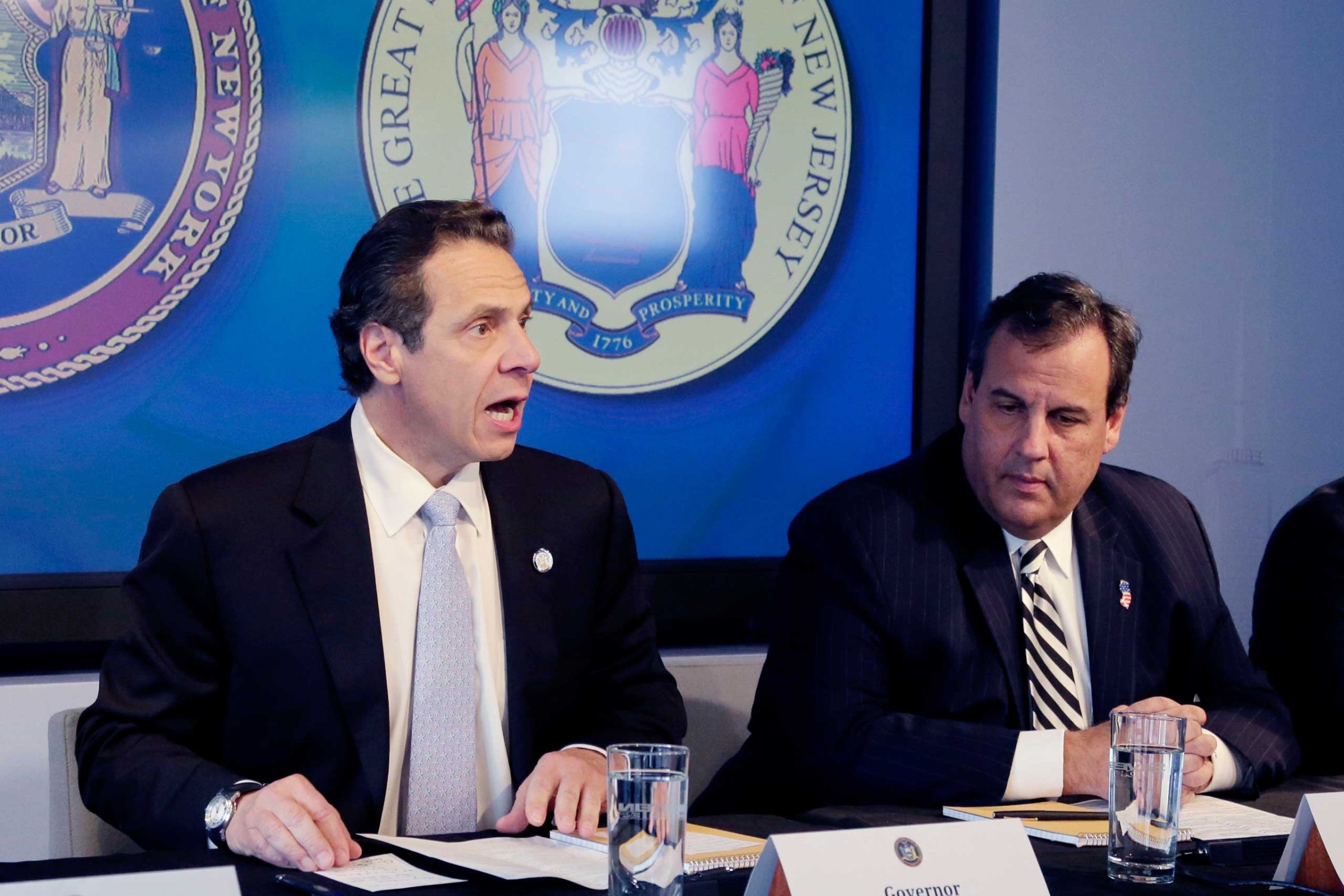
The decision to impose a mandatory quarantine in New York and New Jersey for health care workers arriving from Ebola-stricken nations has opened a rift between the Obama Administration and the governors of those states.
Governors Chris Christie of New Jersey and Andrew Cuomo of New York on Friday ordered doctors and nurses returning to be isolated for 21 days, the incubation period for the lethal pathogen that has killed nearly 5,000 in Guinea, Liberia and Sierra Leone. That was just a day after New York City physician Dr. Craig Spencer, who had been volunteering at a Doctors Without Borders clinic for Ebola patients in Guinea, was diagnosed with the virus. He is in isolation at a Manhattan hospital. The first health worker quarantined under the new provision was the nurse Kaci Hickox, who landed at Newark Liberty International Airport on Friday and is being monitored at a Newark Hospital. She has tested negative for Ebola.
To the White House, the governors’ decision represents politics trumping public-health policy. With voters spooked by the specter of Ebola and supportive of tougher measures to prevent its spread, Cuomo and Christie say they are trying to assuage panic and protect the citizens of their states. But health officials say that health care workers who follow federal guidelines pose no threat to the public. And they worry that a mandatory quarantine will dissuade desperately needed medical personnel from volunteering to battle the virus at the source of the epidemic in West Africa.
The dispute simmered over the weekend, as Administration officials pressed the states to reverse the decision. “We have let the governors of New York, New Jersey, and others states know that we have concerns with the unintended consequences of policies not grounded in science may have on efforts to combat Ebola at its source in West Africa,” a senior Administration official tells TIME.
Christie and Dr. Anthony Fauci, director of the National Institute of Allergy and Infectious Diseases, sparred over the policy on Fox News Sunday. Fauci, a top federal health official, defended the government’s existing protective protocols and argued that a forced quarantine for health care workers who pose a “vanishingly small” risk of transmitting the virus could be a disincentive to volunteers.
“The best way to protect us is to stop the epidemic in Africa, and we need those health care workers. So, we do not want to put them in a position where it makes it very, very uncomfortable for them to even volunteer to go,” Fauci said. “If we don’t have our people volunteering to go over there, then you’re going to have other countries that are not going to do it, and then the epidemic will continue to roar.”
But for the governors, science may be secondary to politics. Polls show that many voters, in the grips of Ebola panic, favor measures to restrict the possible spread of Ebola, even those — like a ban on travel to and from virus-stricken nations — that medical experts say would make things worse.
As a result, Christie and Cuomo stand to benefit from going beyond the safety guidelines set forth by the Centers for Disease Control and Prevention. So does Illinois Governor Pat Quinn, an embattled Democrat embroiled in a tough re-election fight, who also ordered a mandatory quarantine of health workers flying into that state.
Like Quinn, Cuomo is up for re-election on Nov. 4. His Republican opponent, Rob Astorino, has sought to harness the panic to gain ground, pummeling Cuomo’s preparation for the virus as “gross negligence.”
Christie is positioning himself for a possible White House run next year, and his advisers believe that his confrontational style of crisis management underscores his appeal to voters. Picking a fight with the feds over Ebola, even when the science doesn’t support his position, may be a way to resurrect the tactics that earned him bipartisan plaudits after Hurricane Sandy.
Appearing on the same program as Fauci, Christie defended the mandatory quarantine. “I don’t believe when you’re dealing with something as serious as this that we can count on a voluntary system,” he said. “The government’s job is to protect the safety and health of our citizens.”
Hickox, the nurse quarantined in New Jersey, wrote an essay for the Dallas Morning News on Saturday that slammed the decision. “We need more health care workers to help fight the epidemic in West Africa,” she wrote. “The U.S. must treat returning health care workers with dignity and humanity.” She has hired a lawyer, who has been cleared to visit her in the hospital. The American Civil Liberties Union has also inquired about the state’s legal right to quarantine her given her negative Ebola diagnosis.
In New York City, Mayor Bill de Blasio called the way that Hickox has been treated “inappropriate.”
— With reporting by Zeke J. Miller
More Must-Reads From TIME
- The 100 Most Influential People of 2024
- The Revolution of Yulia Navalnaya
- 6 Compliments That Land Every Time
- What's the Deal With the Bitcoin Halving?
- If You're Dating Right Now , You're Brave: Column
- The AI That Could Heal a Divided Internet
- Fallout Is a Brilliant Model for the Future of Video Game Adaptations
- Want Weekly Recs on What to Watch, Read, and More? Sign Up for Worth Your Time
Write to Alex Altman at alex_altman@timemagazine.com